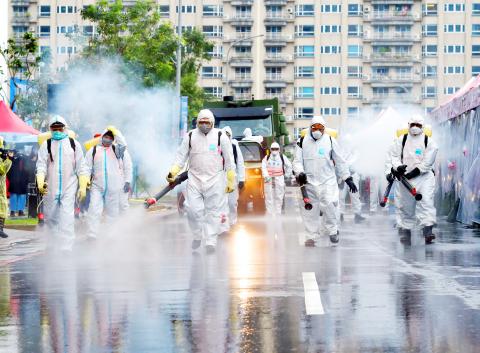The nation’s first large-scale emergency drill to test disease prevention and control measures for a possible community transmission of COVID-19 was yesterday held in Yangbei Community (央北社區) in New Taipei City’s Sindian District (新店).
New Taipei City Mayor Hou You-yi (侯友宜) served as the drill commander, while Minister of Health and Welfare Chen Shih-chung (陳時中) — who heads the Central Epidemic Command Center (CECC) — and CECC advisory specialist panel convener Chang Shan-chwen (張上淳) attended the one-and-a-half-hour operation.
A total of 450 people, including city government officials, healthcare workers, military personnel and community volunteers, participated in the drill.

Photo: Fang Pin-chao, Taipei Times
Four scenarios were simulated, with the first being “disease prevention promotion” before a community infection and the second being “some sporadic confirmed cases.”
The third was a “virus transmission in a single community” scenario, in which enhanced community entry-exit controls would be implemented, and the city’s Department of Social Welfare and Animal Protection Office would shelter young children or pets in controlled areas if their parents or owners are infected by the virus.
The fourth scenario was a “large-scale community spread” — defined as more than 3,000 confirmed cases — in which an advance command post would be set up in the community with the most severe outbreak, and a screening hospital would be designated to assess patients and treat them, while Far Eastern Memorial Hospital in Banciao District (板橋) would take in the most severe cases.
The city can hospitalize a maximum of 678 COVID-19 patients, but aims to expand its capacity to at least 1,000 beds, Hou said, adding that the city government has also chosen isolation centers that can quarantine up to 2,000 patients with mild symptoms if a large-scale community transmission occurs.
Medical personnel from 17 New Taipei City hospital branches attended the drill, and simulated assessing patients’ conditions and taking people who are under home quarantine to designated hospitals, as well as clearing out hospital beds in the New Taipei City Hospital’s Sanchong Branch and taking patients to other hospitals.
Military personnel simulated a large-scale disinfection scenario by spraying disinfectant in the streets and public spaces.
Hou said that if the COVID-19 situation gets worse, decisions such as whether commercial activity or schools should be suspended, or whether traffic controls should be implemented, would have to be made by the central government.
A joint drill, including the central government and four cities and counties in northern Taiwan, could be considered as a next step, he added.
Chen praised the drill as “very realistic” and a demonstration of “advance arrangement,” saying that if all local governments show the same preparation, the CECC would be more at ease.
The COVID-19 situation in Europe is worrying, because it shows how a little carelessness can cause the situation in a developed region to worsen rapidly, he said, adding that proactive measures between agencies are important, and that people should remain aware, but not panic.

RESILIENCE: Deepening bilateral cooperation would extend the peace sustained over the 45 years since the Taiwan Relations Act, Greene said Taiwan-US relations are built on deep economic ties and shared values, American Institute in Taiwan (AIT) Director Raymond Greene said yesterday, adding that strengthening supply chain security in critical industries, enhancing societal resilience through cooperation and deepening partnerships are key to ensuring peace and stability for Taiwan in the years ahead. Greene made the remarks at the National Security Youth Forum, organized by National Taiwan University’s National Security and Strategy Studies Institution in Taipei. In his address in Mandarin Chinese, Greene said the Taiwan-US relationship is built on deep economic ties and shared interests, and grows stronger through the enduring friendship between

GAINING STEAM: The scheme initially failed to gather much attention, with only 188 cards issued in its first year, but gained popularity amid the COVID-19 pandemic Applications for the Employment Gold Card have increased in the past few years, with the card having been issued to a total of 13,191 people from 101 countries since its introduction in 2018, the National Development Council (NDC) said yesterday. Those who have received the card have included celebrities, such as former NBA star Dwight Howard and Australian-South Korean cheerleader Dahye Lee, the NDC said. The four-in-one Employment Gold Card combines a work permit, resident visa, Alien Resident Certificate (ARC) and re-entry permit. It was first introduced in February 2018 through the Act Governing Recruitment and Employment of Foreign Professionals (外國專業人才延攬及雇用法),

The Ministry of Transportation and Communications yesterday said that it would redesign the written portion of the driver’s license exam to make it more rigorous. “We hope that the exam can assess drivers’ understanding of traffic rules, particularly those who take the driver’s license test for the first time. In the past, drivers only needed to cram a book of test questions to pass the written exam,” Minister of Transportation and Communications Chen Shih-kai (陳世凱) told a news conference at the Taoyuan Motor Vehicle Office. “In the future, they would not be able to pass the test unless they study traffic regulations

EUROPEAN TARGETS: The planned Munich center would support TSMC’s European customers to design high-performance, energy-efficient chips, an executive said Taiwan Semiconductor Manufacturing Co (TSMC, 台積電), the world’s largest contract chipmaker, yesterday said that it plans to launch a new research-and-development (R&D) center in Munich, Germany, next quarter to assist customers with chip design. TSMC Europe president Paul de Bot made the announcement during a technology symposium in Amsterdam on Tuesday, the chipmaker said. The new Munich center would be the firm’s first chip designing center in Europe, it said. The chipmaker has set up a major R&D center at its base of operations in Hsinchu and plans to create a new one in the US to provide services for major US customers,